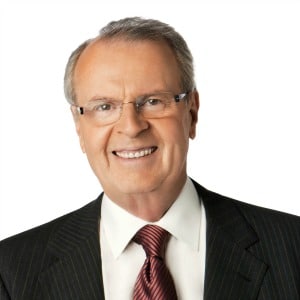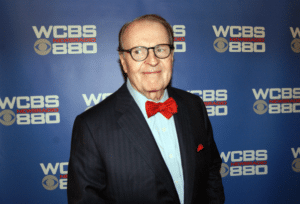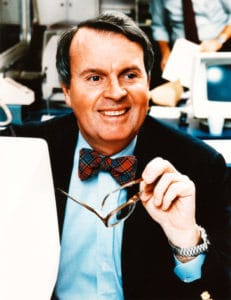
In our final installment of our three-part interview with the great Charles Osgood, we asked him about the evolving news coverage and what he thinks about how the news is being covered today, a much different world than when he first started. Although Osgood recently retired from Television he can still be heard on the radio as part of the Westwood One family. We also asked Osgood to share some advice for young broadcasters hoping to get into radio news and why he decided to stay in radio after retiring from Television.
RI: What is your opinion on how the news is being covered today? Are you happy about it? Do you think the folks that started in news in the early days would be happy about it?
Osgood: I am sure they would not be. Some of them are still around. I have been around pretty long myself. I know a lot of people who have followed news, and it does change. It changes over time partly because of technology and just partly because the people keep changing. People are not the way they used to be. They don’t think the way they use to think. I happen to be one who believes that television does not help them to think any better. Yes, they make you think. But if you listen to somebody who is railing about his personal opinions and you like to listen to that person because those opinions are pretty much the way you tend to think about things, you’re not going to learn anything. You’re just going to have your feelings confirmed if somebody out there maybe expressed those feelings better than most of us could by ourselves. I spent a certain amount of time in Europe and I don’t speak any languages other than English, but it seems to me that there is a better understanding of the rest of the world…we are traditionally less interested, ever since we declared independence and declared ourselves a separate country. We are more interested in what happens locally, which is one of the reasons that I think network radio works so well. The local station can report the local stories. And then for the bigger picture, if you happen to be a network station, you can draw on the experience and the perspective and knowledge, what knowledge there is, to augment that and give you a better picture of what’s happening in the world.
RI: When you do your research, what is it that you’re looking for to make your broadcast interesting?
Osgood: I understand what you’re asking. My test for whether something is interesting is whether it interests me. If I think, “Isn’t that something?” If there’s some new technology that’s likely to affect all of our lives, either in the medical world or something else, the way people are living, that’s something that will catch my attention. Then we try to relate how it might if affect your life and also how they happened to come up with this. Or try to make that story… I feel what we really should do in broadcasting, or for that matter, in running a newspaper or magazine or anything that’s mass media, is to make what’s important interesting. If you take that thing that’s very important, but you don’t do it well, you don’t tell the story well, then you’re not doing your job. And the reverse is true. To make the things that are of importance and make them compelling enough that people will come back and listen to you tomorrow.
RI: What would be the kind of piece that you love to do the most then?
Osgood: It is a very intimate medium. Even though you may be talking to millions of people at the same time, you don’t think of it that way. They’re listening to you one at a time. Or maybe in the case of community cars, three or four at a time. They’re probably talking back at you, although you don’t know it. I always say, “I will see you on the radio.” That’s the way that I picture them, being one, or at the most a few, people. And they’re also doing something else at the same time. They’re driving or reading. You have to craft your stores in such a way that you capture people’s attention. If you don’t capture and hold that, they’re going to get to work and just turn the radio off when they turn the car off and you’re gone for the rest of the day. I think what people want to hear is stories that they can relate to, that mean something to them that isn’t necessarily important because of the political impact that it will have. I think one of the most simultaneously shocking and boring things that I have ever heard are the debates between the two presidential candidates that we’ve had.
RI: What advice would you have for anybody who’s thinking about getting into radio and covering news on the radio?
Osgood: I think first of all, it has the additional advantage of having available jobs. It does not pay very well. But, in big markets, it can, if you get a following. But it is fun, just as I always suspected it would be. The people you work with are good company. I think we all enjoy. There is a lot of competition in broadcasting, but those are the people you surround yourself with. I think it helps you do better.
RI: Without getting political, when you see what’s going on, are you worried about the country?
Osgood: Sometimes the more you listen, the more you worry. I am in the old tradition of CBS news, when you couldn’t tell when somebody was liberal or conservative or Democrat or Republican by the way they spoke. That applies, in those days, you had the Murrows and Charles Collingwoods…. I tell you who I think one of the best television news people was, my predecessor on Sunday morning, Charles Kuralt. If there were other reporters there, Kuralt didn’t want to be there. It’s the sort of the opposite of a news conference, where the press stays seated in a certain area and Senator Mouth of wherever is giving a news conference. He can sort of select the questions and the people he knows, that he knows will ask the questions that he wants asked. He would find these stories. Sometimes he would find them in local newspapers about somebody who did something…the guy who passes on the corner of Elm and Maple Street and waves at everybody that goes by, or somebody who has a peculiar hobby or has made the world’s largest ball of string, or something like that.  That works wonderfully well because you can actually see the ball of string. Most of the things that we talk about in political campaigns, you can’t see. It’s stuff that you talk about, to some extent. I think you have to have some awareness of how what you’re saying is going to affect all the neighborhoods in America and all the people. I don’t think we do that anymore, half as well as we once did.
That works wonderfully well because you can actually see the ball of string. Most of the things that we talk about in political campaigns, you can’t see. It’s stuff that you talk about, to some extent. I think you have to have some awareness of how what you’re saying is going to affect all the neighborhoods in America and all the people. I don’t think we do that anymore, half as well as we once did.
RI: Why continue with radio after your retirement from television?
Osgood: Well, because I like it. As a matter of fact, I would’ve continued in television. I liked doing that too. But I think television is quicker on the trigger when it comes to realizing that somebody is now in their 80s and isn’t going to draw the always desirable audience of 18 or so. We actually had some pretty good numbers of young people. And, being on at the time that it’s on, parents will maybe turn on, on Sunday morning, and so the kids get interested in the stories, because they’re human stories. Also, we are not afraid to do a story about rock music. As a matter of fact, we are more likely to do that than we are something…. we want to promote everything that we do, but I sometimes wonder when you’re talking about doing a piece about chamber music or ballet dancing or something like that, some people will say, “I wonder what else is on.” It cuts both ways. But I think we have a very, very large audience, about 6 million people, which is more people than watch television during the week, I think, on any network. I would continue doing both radio and television. But, if I had to do just one, which now turns out to be the case, I am perfectly happy that it’s radio. Also, I think in some ways, with pictures, you are captive to what pictures you have available. You might ask, “Why do we say that?” or “Why do we do that?” and you say “Oh, because we have this picture.” Ok, well. You use the resources that you have. That’s what we all have to do.
Before joining CBS News in September 1971, Charles Osgood was an anchor/reporter for WCBS News Radio 88 in New York. Prior to that, he worked for ABC News, was the general manager of WHCT-TV Hartford, CT, and the program director and manager of WGMS-FM Radio Washington, D.C.
Read part one of our interview with Charles Osgood HERE
Read part two HERE






